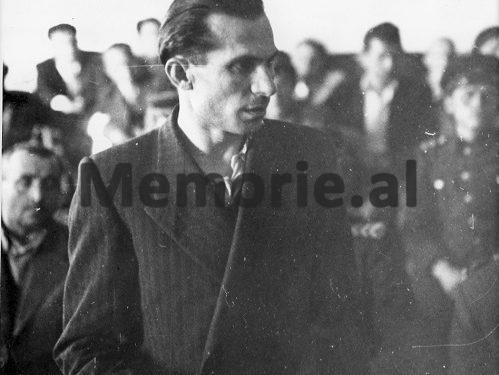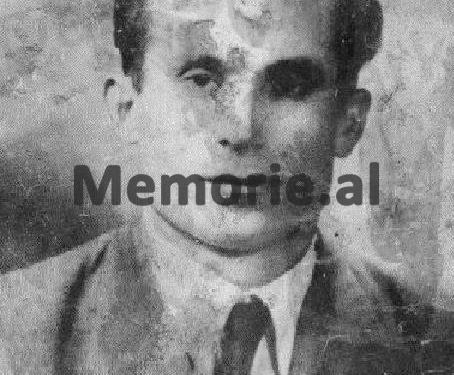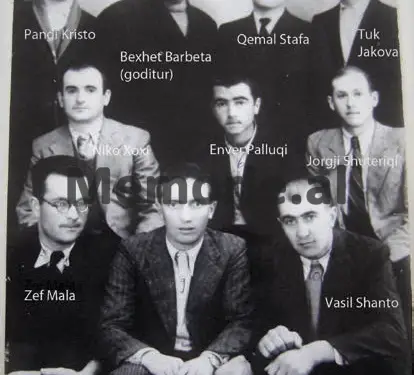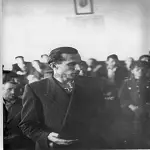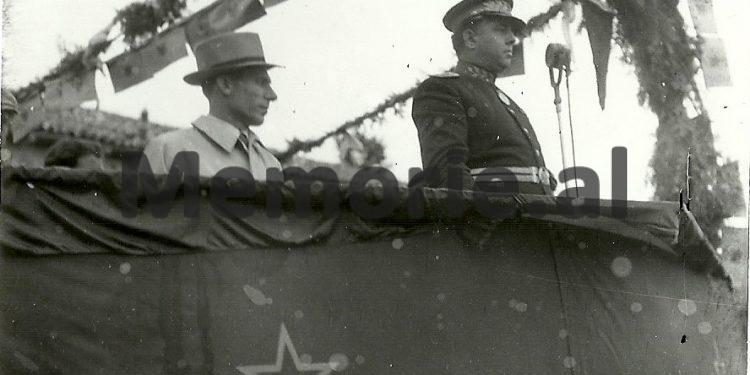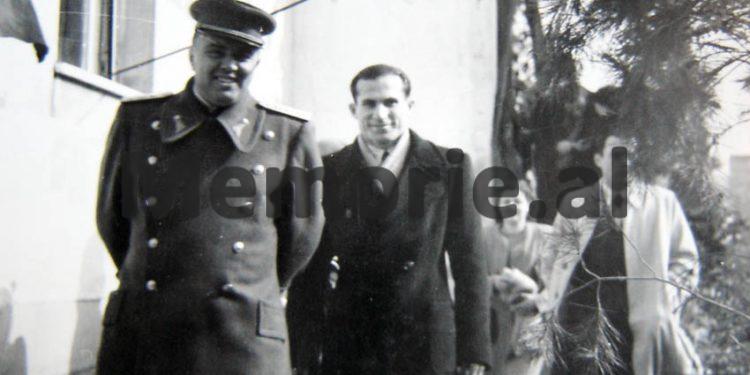By Gjergj Titani
The first part
Memorie.al / for the first time, we were able to provide the testimony of the witness of many historical events. The conversation with Pandi Kristo, a senior figure of the Communist Party of Albania and the Albanian state, took place in Tirana, in the house of his son-in-law, Robert Vullkani, where he was forced to live, when he was released from exile, since the Albanian democratic state, never gave him a home. The regime, for which he fought, targeted him to liquidate Pandi Kristo, placing him in the group of Koçi Xoxes, convicted for “hostile activities”. For 42 years in a row, I would wander the prisons of the communist dictatorship and successive exiles, until communism was overthrown forever, at the beginning of the 90s. The interview was conducted in the years 1992 – 1993 and over the years, it was completed, according to the memories and family archive of Pandi’s daughter, Assembly Kristo (Vullkani), sister, and veteran of the Anti-Fascist National Liberation War, his son-in-law, Robert Vullkani and the memories of many contemporaries. Here is Pandi Kristo’s confession.
Lord Christ, can you remember what happened to you during these 54 years?
Yes of course. Staying away from all empty statements, I would like to chat with readers, if there is interest. For over half a century, I haven’t had the opportunity to communicate with my contemporaries and the younger generation about what happened during these years. However, when you have not spoken for so long, you feel that you not only want to speak, but you will speak exactly, what is most essential. At this age, I want to talk not about politics, but about what is more essential, about the history of my life and of many personalities of this country, painful of course, because I and my generation, but also others before us, do not have done little to enjoy what we were able to create.
The road was long, arduous, full of successes and mistakes, which I will sincerely try to refresh to my peers and tell them, as they happened, not as the truths have been distorted, which is which happened not infrequently. I was born in the city of Korça, during the difficult time of the First World War, when the fate of national existence was at stake. Those years were full of anarchy and Albania was occupied by the Austro-Hungarians and Serbs in the north, by the Italians in the south, by the French and Greeks in the southeastern provinces. The fragile Albanian state, announced by the elder of Vlora, Iasmail Qemali, was in danger of disintegrating. However, the situations were such that Albania escaped, so weak, poor, anarchic and without a government.
When and where did you first come into contact with communist ideas?
I came into contact with communist ideas in Korça, quite naturally. In Sotir Vullkani’s shop, where I joined as an apprentice, left worker ideas had penetrated for a long time, which then turned into social-democratic ideas. As Sotiri said, these ideas were introduced over time by a group of Serbian social-democratic leaders.
As one of the senior members and then leader of the Communist Group of Korça, how and when was this group created?
In those years, I worked as an assistant foreman in Sotir Vulkani’s shop. I remember that Sotiri told me that from April 1928, parallel to the Communist Group of Korça, with a nucleus from our background, workers and citizens, another communist group was created, with almost the same program and statute as tone, operated mainly in intellectual circles. It included: Todi Maliqi, a student in Medicine, who had come into contact with communist ideas since university. He was also the leader of this group. Its other members were: Naun Stralla, engineer, Vasil Balli, owner of the Leather Factory, Vaskë Mani, Anastas Plasari, Koço Jakova, Dhimitër Fallo, Sotir Gurra, and some others, that I don’t remember, because since then they have past 70 years.
These friends held several meetings outside the city, in nature, on the hill of Saint Ilia, drafted the program and the statute, regularly revised these documents and buried them, somewhere in a tree trunk, which they called “the trunk of the group’s tree” “. Over the years, this communist group, equipped with a fairly good theoretical culture, was composed of intellectuals and students who came mainly from foreign universities, but not having a broad base in the working class and the civic strata, it merged into our group. Many anti-monarchist and anti-fascist democratic intellectuals, who hated the intervention of fascist forces in the Republic of Spain, the expansion of Nazism in Germany and Japanese militarism, approached the Communist Group of Korça. They, along with us, sincerely hated the creation of the Berlin-Rome-Tokyo anti-communist axis.
Of course, we also hated the introduction of Romania, Bulgaria and Hungary, in support of this axis. The most prominent intellectuals, who were listed alongside us, were: Kristo Kono, an outstanding musician, Kristaq Cepa, a respected educator, Manol Konomi, a lawyer with great culture, and others. Then, in the 30s and beyond, many prominent people joined the Communist Group of Korça, such as: Kiço Kasapi, Kostika Kulla, Demir Pojani, Stavri Themeli, Esat Molla, Kiço Nedelli, Llambi Dishnica, Stefo Grabocka, Miço Simo, Mina Uçi, Kleopatra Maliqi, Ollga Mitrushi, Maku (Mandi Koçi), Nasi and Llazi Mitrushi, Petro, Misto and Dhimitër Treska, the Shamblli brothers, Teni Konomi, Vaskë Treska, Mihallaq Gjinikasi, Pirro Tërpo, Nesti Kerenxhi, Teni, Dhori and Ilektra Samsuri, Raqi Kerenxhi, Lefteri Gjoka, Vaskë Gjino, Peço Nedelli, Bardhyl Pojani, Stavri and Nasi Kostallari and many, many others.
Of course, all these young people were led by the initial and permanent core of the GKK: Sotir Vullkani, Koçi Xoxe, Miha Lako, Koço Tashko, Pilo and Gaqo Peristeri. I remember that in these years, the numerical amount of the GKK reached over 120-150 people. In these conditions, we created our core in Pogradec, with friends Nuçi Tira, Koli and Pirro Gusho, Llazi Mêngri, Llazi Angjeli, Myfit Guxholli, and others. In Bilisht and Devoll, with our old friend Kaçani, whose name I don’t remember well, Lefter Lakrorin, Janaq Karapataqin, Fuat Babanin, Jorgo Plaku, Maqo Çomo, and others. In Erseka, with Josif Pashko, Mitraq Vodica, Çome Vodica, Xhaferr Lubonja, Ilmi Selenica, Bexhet Selenica, Sulo Kozeli, Skënder Selenica and others. In Kuçovo, the veteran Mafuz Lazen. In Berat, Gjin Marku, Koli Myzeqari, the Sallabanda brothers, and others. In Fier, Sokrat Bufi, Muzafer Trebeshina, etc.
In Durrës, Sotir Vulkanin, Abaz Kondin, Telat Nogën, Sotir Nogën, Nako Spirun. In Tirana, our group created a powerful communist core, with Anastas Lula, Sadik Prente, Ilo Panduku, Pali Tërrovë, Xhavit Qesen, Kristo Frashër, Neki Çakërri, and many others, who then broke away from us and, first, they created a faction of the Communist Group of Korça, and then, as a result of our poor work, they split off as a separate faction.
What about you, when were you accepted into the ranks of the Communist Group of Korça?
I remember that at the beginning of the establishment of the Communist Group of Korça, it was not very easy to participate, but also the rules that we established afterwards did not yet exist. At the beginning of 1930, Sotir Vullkani communicated to me that I had been accepted into the Group since its foundation, which does not completely match what Enver Hoxha said in the book “When the Party Was Born”, because we had the leadership of the group, which strictly respected the rules of rotation, where Sotiri, Koçi Xoxe, Miha Lako and Koço Tashko, who had the secretary of the first communist cell, Nesti Gambeta, and others were the presidents. Among other things, the group gradually created a good base of publications, translations, a rich photographic archive.
Many photographs of that time, of a quality to be envied. Can you tell us who made them?
Almost all the photos that remain from these unforgettable activities, but also from activities of great importance for the national history, were taken with great passion and high artistic level by our friend Mandi Koçi, a long-time member of the Communist Group of Korça, activist and anti-fascist from the early days, who, although seriously ill, was sentenced to 25 years in political prison. The technique of the Communist Group of Korça, (I mean that of the publications and the photo-archive), and later that of the Albanian Communist Party, was very carefully placed in the well-known laboratory “MAK”, in the center of Korça.
Mandi Koçi, after studying first in Belgrade, and then in Moscow, became the first Albanian operator of the first Albanian feature film “Tana”. He worked on almost all Albanian artistic and chronic documentaries, in collaboration with the talented Soviet director, Ilia Kopalin. His wife, Roza Koçi, was the co-author of the first Albanian-Russian dictionary. It must be said that Maku, (Mandi Koçi), has a daughter in Russia, who I am sure does not know the whole tragedy that his father has suffered. Mandi Koçi, for his outstanding anti-fascist activity, was interned in Porto Romano, together with Pëllumb Dishnica, Todi Maliq, Mit’hat Frashëri, Zai Fundon, Manol Konomin, Stefo Grabockë, Safet Butke, Mina Uçî, Reshit Çollak, Sadik Bekteshin, Qazim Kapisizin, Spiro Shalesi, and others.
This artist, with a great human spirit, was released from exile only when Fascist Italy capitulated, with the special intervention near the Vatican, of the great Albanian personality, Eqerem Çabej. This powerful personality of Albanian photographic and cinematographic art, prominent personality of the Anti-Fascist National Liberation War, whom I would without hesitation compare as a worthy student of great Albanian photographers, such as: Marubi, Sotiri, Burda, Sulidhi, and others , has been forgotten. He died on March 23, 1986, when he was released from prison, in a miserable and catastrophic state of health, and was inhumanely abandoned, in a poor asylum in Tirana, until he passed away.
As a veteran of the Albanian Communist Movement, what can you tell us about the Communist Youth Group, because until today, the problem of this Group has been treated unilaterally and without any opposition to alternative treatment?
The Communist Youth Group, which was nothing but a beautiful and alternative faction of the Communist Group of Korça, based in Tirana, mainly in the “Harry Fultz” American Technical High School, had gathered many sympathizers around it young men and women of the capital and other cities, such as: Durres, Vlora, Shkodra, Fieri, Elbasan, Kruja, Dibra, etc. This communist group had its own program and charter, which did not differ much from the charters and programs of other groups. He condemned fascist and Nazi ideas and fought with all his might so that these ideas would never spread in our country.
His intellectual and class composition was very good, because the students of the American technical school of Tirana were from families with working, intellectual and patriotic backgrounds. They had in their bosom, members who knew several foreign languages and read progressive and democratic literature. His communist and anti-fascist activities soon spread throughout the country and with the invasion of Albania on April 7, 1939; they were totally included in the Anti-Fascist National Liberation War. They took part in the first anti-fascist revolts and demonstrations, just like all the members of the communist groups, if not more, and more fiercely than the others.
From the bosom of these members, who were able to escape alive until our days, genuine powerful intellectuals have emerged, but it should be noted that due to the repressive measures of the Albanian Communist Party against this group, apart from its leaders, a number of extraordinary, with the trial and behind the backs of members and sympathizers of the Youth Group. It is a pity that, as an old but repressed communist, since 1948, I have not been able to show my positive opinion, at least for the moral and real rehabilitation of this very sympathetic segment of the Albanian Communist Movement.
Even worse, due to the severe sectarian activity of Dushan Mugosha and Liri Gegë, the members and sympathizers of this group did not accept many of the initial mistakes of the Albanian Communist Party as genuine decisions that had to be strictly implemented. In the conditions of the fascist occupation of the country, the factional group of Vlora, led at that time by Pali Tërrova, was hit, apart from Anastas Lula and Sadik Premte, who were its leaders. In the activity of this group, Jorgo Plaku, an excellent student of the American Technical School and one of the first illegals in Albania, was also involved and punished by the NPSH.
Who influenced the subsequent Youth Group strike?
These young people, resourceful, diligent and highly cultured, were called the ‘Youth Communist Group’, which, I can say with full conviction, as a result of our sectarian attitudes, but with the intervention of the Yugoslavs, has been condemned unfairly by the NPSH. This group had alternative communist thoughts and programs and voluntarily agreed, with full sincerity, to join the Albanian Communist Party and the Anti-Fascist National Liberation War. But, especially Miladin Popovici, Dushan Mugosha and Enveri, but also the rest of us, bear a heavier responsibility for the silent, heavy and open war that you declare to this group. I, at first, did not understand the unreconciled and unprincipled war that was waged against this group, especially when I saw that many of its members were our comrades, communists as determined as we are.
Today, when 80 years of effort, war, but also 25 years of personal and family persecution weigh on my shoulders, I say that many important issues, related to the history of the Albanian Communist and Workers’ Movement and the KPSH ALP, which was the ruling party and the only one, its problems are equal to the problems of the country’s history of that period, they need to be fundamentally re-examined and rewritten by specialist historians. It is not like today, when pluralism was formalized and political parties do not have the authority enjoyed and exercised by the NPSH and APS, at the time of their rule. I say this, without any hesitation, because my long experience and my experiences of difficult persecution have led me to these conclusions.
Pandi Kristo, from the war in handcuffs…!
Pandi Kristo was born in Korça on July 29, 1914, in a working family with patriotic feelings. He received his primary and unique education in his hometown, but due to difficult economic reasons, he did not continue his education, but he did his best to ensure that his brother and sisters received the best education. Very young, he started working as a shoemaker in the workshop of Sotir Vulkani, founder of the Communist Group of Korça, and then in the “Titan” workshop, an important center of the Communist Group of Korça. Pandi Kristos, very soon the problems of life and family fell on his shoulders, to solve them, but he also understood the social problems that the Albanian society had. He participated in all the cultural activities, revolts and demonstrations organized by the “Puna” society, against the regime and the revolts of the Communist Group of Korça, against the fascist invaders, as one of the main leaders of that group.
In January 1938, in the trial against the communists that took place in Tirana, (the trial of Qemal Stafa, Vasil Shanto, etc.), he was convicted and imprisoned in Mbrezhdan, Berat. When staying in the city became impossible for him, he went to the mountains and with the creation of the Korca District Headquarters; he was appointed its commissioner. At the First Conference of the Country, which was organized in Labinot, in March 1943, he was elected a member of the Central Committee of the NPSH. Meanwhile, at the First Anti-Fascist Congress, which was convened in Përmet, on May 24, 1944, he was elected a member of the presidency of the National Liberation Anti-Fascist General Council. At this time, he replaces Bedri Spahiu, in the position of commissioner of the First Operational Zone Vlora – Gjirokastër – Përmet – Tepelën – Mallakastër.
In the Second Plenum of the Central Committee of the KPSH, which met in October 1944, he was elected a member of the Political Bureau of the KPSH and was also appointed head of the Secret Information Service. Immediately, after the complete liberation of the country, he was appointed Political Secretary of the District Committee of the Party in the Tirana-Durres area (1945), and then he was transferred to the Central Committee apparatus of the NPSH. In 1946-47, he was appointed chairman of the State Control Commission and in 1948, minister without portfolio. In the 11th Plenum of the Central Committee of the NPSH, severe party and administrative measures are taken and in the First Congress of the NPSH, it is criticized and accused, together with Koci Xoxen and his group, “for the pro- Yugoslav, anti-Albanian and anti-Soviet”, and others.
Excluded from the Political Bureau, the Central Committee of the KPSH and also from the Party. On November 28, 1948, he was arrested at the Headquarters of the Central Committee, then investigated, tried and sentenced to 20 years of imprisonment. He served his sentence in Tirana, in the Old Prison, in the New Prison, in the Craft Prison and in Burrel. In October 1963, he was released from Burrel prison and lived in the city of Lushnja, as an exile, where he worked as a shoemaker. In 1991, with the disbanding of the infamous Deportation-Internment Commission, he returned to Tirana. He was a deputy of the People’s Assembly in the first legislature, for the city of Korça. It has been decorated with many orders and medals from the Presidium of the People’s Assembly, but still not rehabilitated. He died in Tirana, on October 2, 1994. Memorie.al
The next issue follows




